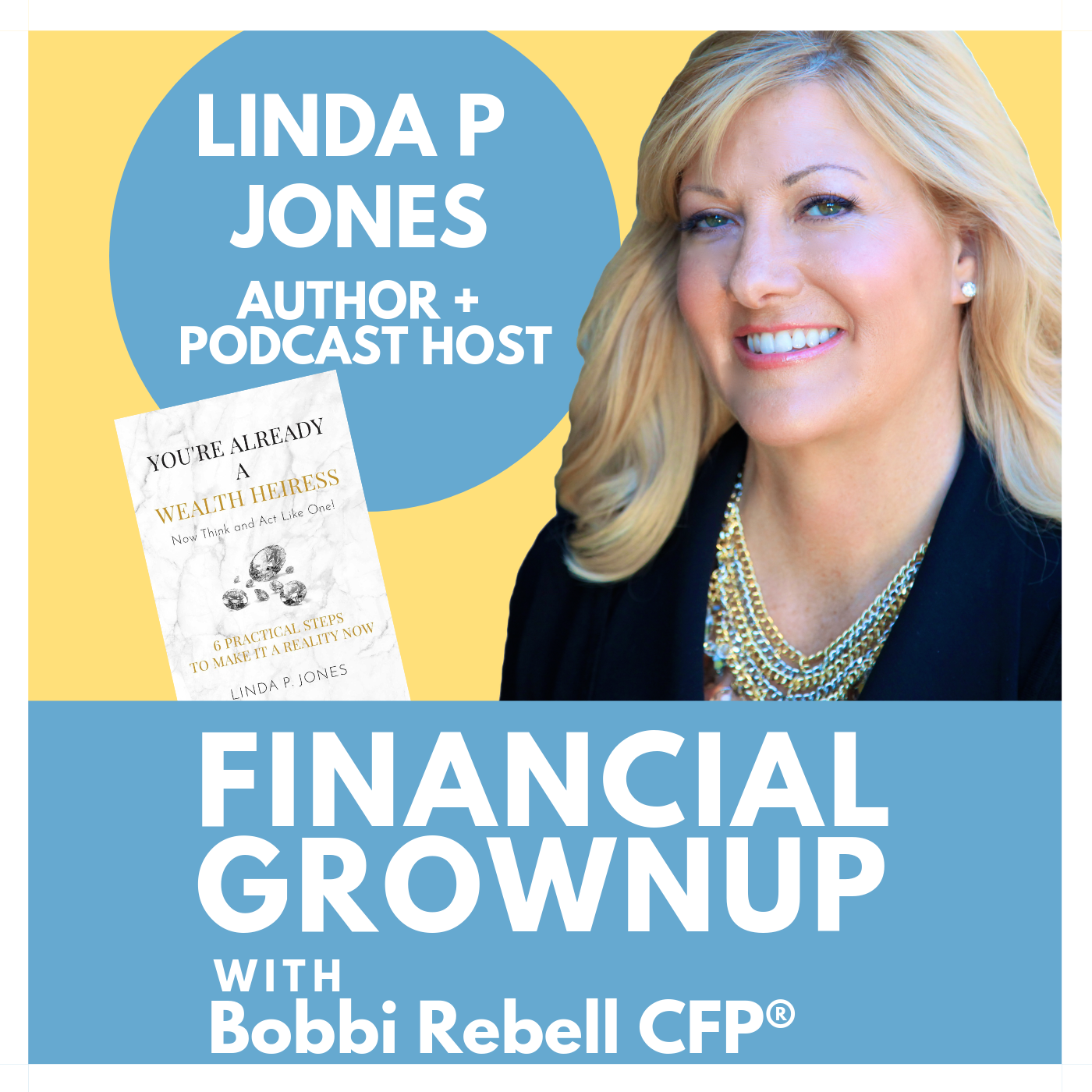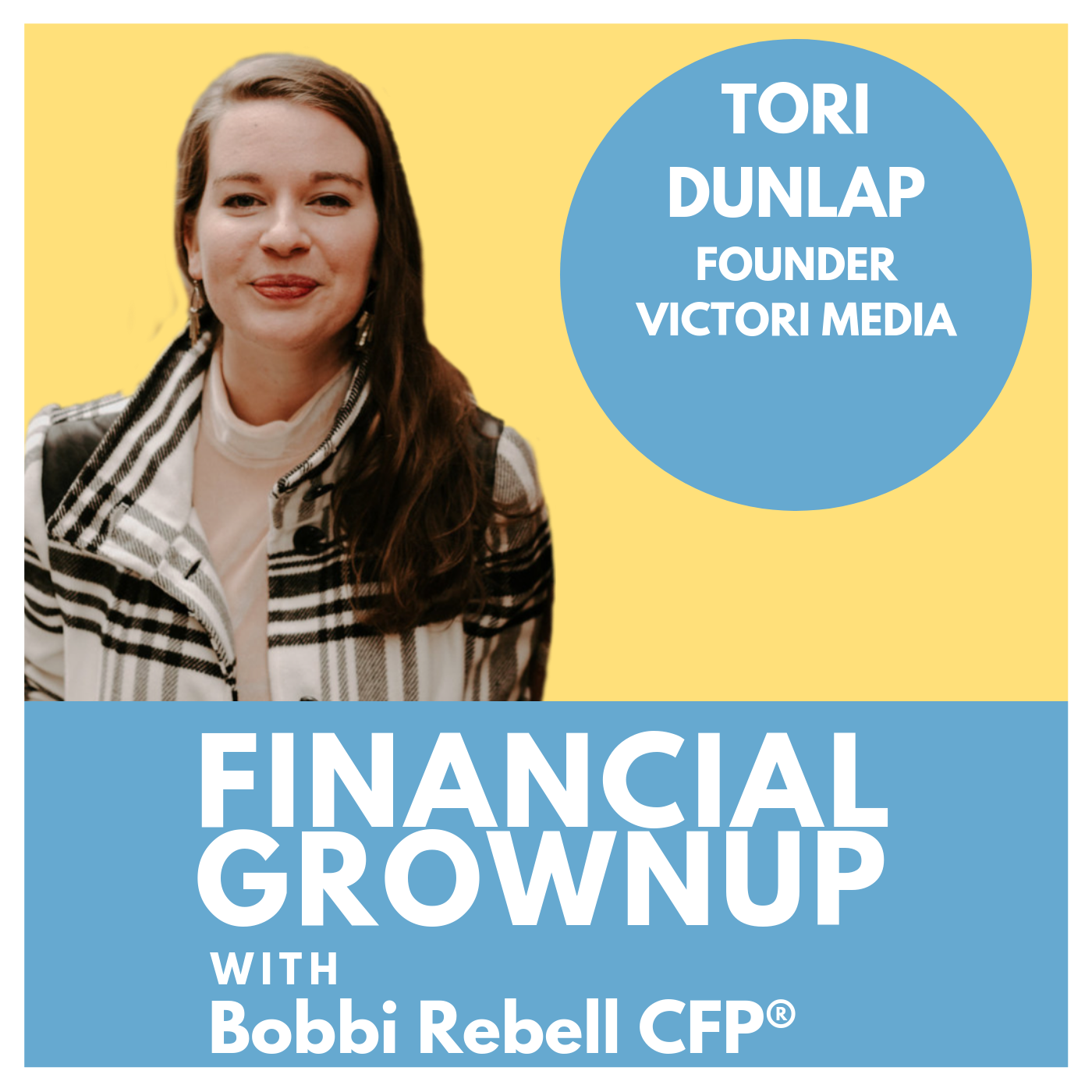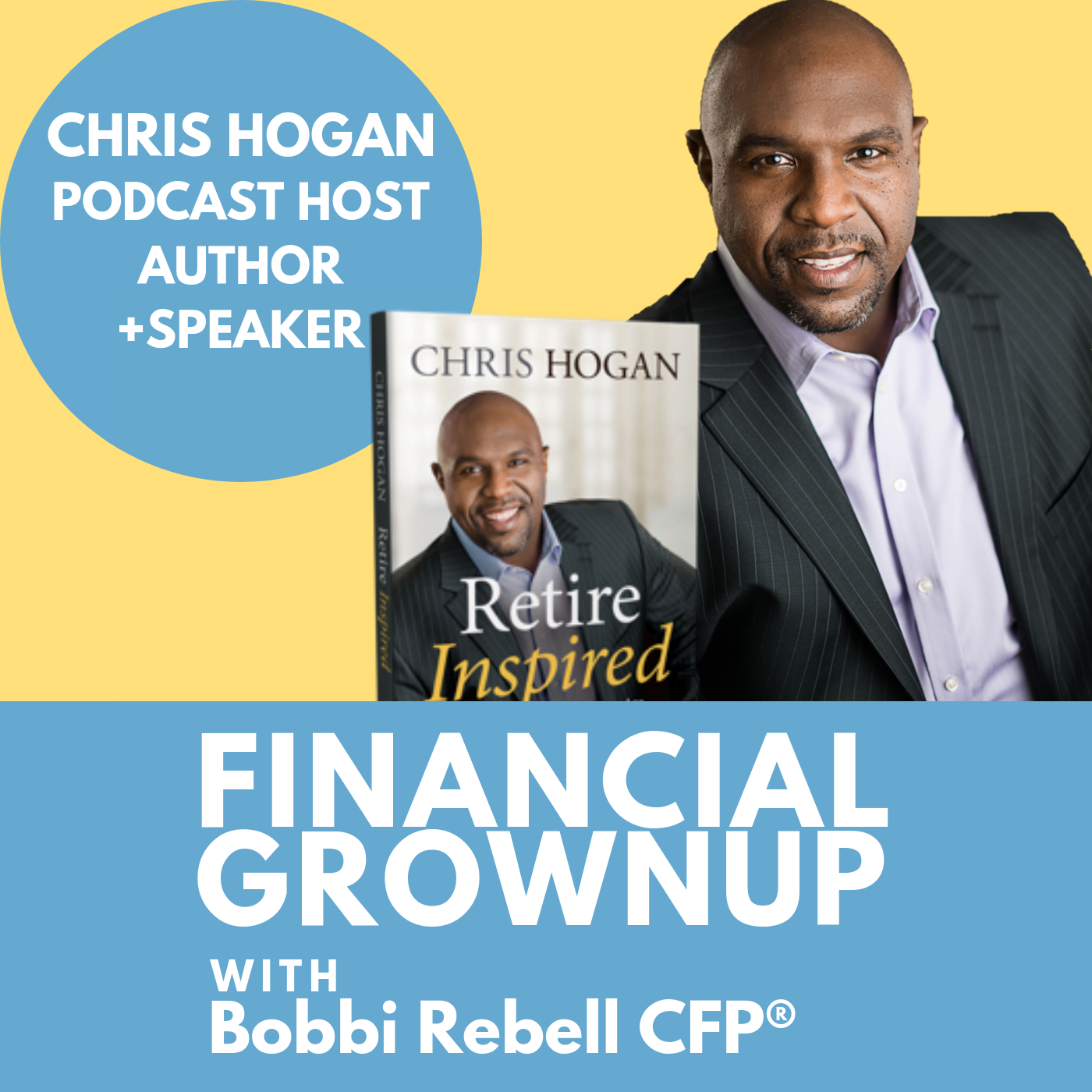Transcription
Ryan Serhant:
We got into this fight with this one guy that wanted us to stack his would be in a strange way in his house around all the different fireplaces, because I also didn't prepare for how people wanted the wood actually delivered. And my delivery guy got really pissed off, got in his pickup truck and he drove off and left me and my little seven-year-old brother on the side of the street.
Bobbi Rebell:
You're listening to Financial Grownup with me, certified financial planner, Bobbi Rebell. Author of How to Be a Financial Grownup. But you know what? Being a grown up is really hard, especially when it comes to money. But it's okay, we're going to get there together. I'm going to bring you one money story from a financial grownup, one lesson, and then my take on how you can make it your own. We got this.
Bobbi Rebell:
Hey Financial Grownup friends, that was million-dollar listing star and newly minted author, Ryan Serhant, getting real about his first sale experience. It did not go well. Thanks everyone for joining me. This episode is a big deal, and not just because of Ryan Serhant. He is a big deal, though. It's even bigger because it is Episode 100 of the Financial Grownup podcast. We are also celebrating being a finalist for best new personal finance podcast at the Plutus Awards. And, the paperback of my book, How to be a Financial Grownup, is coming up October 2nd. None of this would be possible without my amazing editor and secret weapon, Steve Stewart. So, thank you, Steve. And thanks to all of you for joining us on this journey.
Bobbi Rebell:
Now, to the fantastic Ryan Serhant. When you read his book, Sell It Like Serhant, and if the title sounds familiar, yes, he has another reality TV show on Bravo called Sell It Like Serhant, you're going to learn more about this incredible guy. But of note, he says he was not a natural salesman. That came later after learning from experience. So, we talked about how he learned about sales and being successful in business. Here is Ryan Serhant.
Bobbi Rebell:
Hey Ryan Serhant, you're a financial grownup, welcome to the podcast.
Ryan Serhant:
Thank you for having me.
Bobbi Rebell:
And happy pub day, we are taping this on the day that you're amazing book, Sell It Like Serhant: How to Sell More, Earn More, and Become the Ultimate Sales Machine, is coming out. It's already a bestseller and comes on the heels of so much other success. Like million-dollar listing New York, and my new obsession, your vlog. So, congrats on all.
Ryan Serhant:
Oh, thank you. Thank you. I appreciate it.
Bobbi Rebell:
I want to talk to you about your money story that you brought. It has to do with the very first experience you had in sales, which makes perfect sense coming from the ultimate sales guy. Tell us about the firewood and your brother.
Ryan Serhant:
So, I wasn't a natural salesperson. And I think it's very hard for people to be born as natural sales people. And what that even means, I could write a whole nother book about it. But I was a very shy and little kid. All I knew was that in order to be able to have money to spend, I had to make money. And if my parents weren't going to give it to me and if I was in school and was too young to get a job, what could I do?
Ryan Serhant:
We lived on a farm outside Boston, and my little brother was seven. We were doing a lot of ... my parents were kind of like cutting down trees and making way for pastures and things like that. And I just saw all these trees laying all over the place. And asked my dad one day, "What are you doing with all of those streets?" He was like, "Wow, they get cut off, they get sold off. They get turned into malts. It just kind of gets recycled." And I was like, "Well, we have fireplaces in our house and we get firewood, don't you buy that from somewhere? What if we take the trees and we cut it up and I sell the firewood?" I had no idea how he's going to do it, I was not big enough to hold an axe. But my dad said. "Okay."
Ryan Serhant:
He said, "What's your company going to be called if you're going to be a firewood selling company?" And we took out a little ad in our local newspaper. I think it was called Ryan Jack, because my little brother's name is jack, Firewood Company. I think that's literally what it was.
Bobbi Rebell:
Who paid for the ad, Ryan?
Ryan Serhant:
We did out of our minimal allowance.
Bobbi Rebell:
Okay. So, this was your startup capital costs?
Ryan Serhant:
Yeah, that was our startup capital cost. Because they were doing all this tree clearing anyway, there was a wood splitter that was already there. And my little brother and I started splitting wood, and we bulk it up into chords, and we put it in the back of a pickup truck. And then we would get the guy that kind of was helping cut down the trees to be our delivery guy to then go supply people with their firewood. And that was our first little business. And it came crashing down.
Bobbi Rebell:
Yeah, that's what I was going to say. There were some challenges, things you didn't think about.
Ryan Serhant:
Well, I didn't think about customer service and how to deal with people who are unhappy with their firewood. All I knew was I live at this house down the street, there's a bunch of cut down trees, we're going to cut it up and sell it. What do you mean that there's different types of firewood, different types of trees, different types of drying, termites, all these things I didn't even think about?
Ryan Serhant:
So, we had some tough customers in the beginning, and I also didn't think about how I was going to get the word anywhere. So, I thought that the guy that was cutting down trees was going to help and just help us drop it off, we're little kids. But he wanted to cut, and then we got into this fight with this one guy that wanted us to stack his wood really really in a strange way in his house around all the different fireplaces, because I also didn't prepare for how people wanted to what actually delivered. And my delivery guy got really pissed off, got his pickup truck, and he drove off and left me my little seven-year-old brother on the side of the street which is random guy.
Bobbi Rebell:
You're kids. Oh, my gosh.
Ryan Serhant:
Yap. That was the end of our firewood business.
Bobbi Rebell:
Wait, in the end, was there a profit or loss when all settled in?
Ryan Serhant:
Definitely a loss. I don't know how much we lost, because I didn't really understand what my time was worth at 10 years old.
Bobbi Rebell:
Exactly.
Ryan Serhant:
And our capital cost was that one ad. We might have run two ads. I can't remember what they cost. Maybe it was 20 bucks and ad. It wasn't a huge loss, but it definitely was a ding to the self-esteem that maybe I don't want to run my own firewood selling business.
Bobbi Rebell:
Glad you moved on to real estate. What's the takeaway for our listeners?
Ryan Serhant:
The takeaway from that is anticipate and be prepared with realistic expectations. Just having wood to chop down and sell it is a very, very small part of actually creating a firewood selling business. So, you need to be prepared for all the objections and all the issues you're going to run into.
Bobbi Rebell:
Which are things that apply to all sales, which we'll get to in just a minute. I just want to get to your everyday money tip.
Ryan Serhant:
Yeah, there's something that I have in the office. That is a photo of myself as an 80-year-old man. There's this app you can get on your phone called the Faces App, someone just showed it to me. You take your photo of yourself and it realistically ages you, which is pretty crazy. But that photo is future Ryan. And every day, I think about that guy. Because I mean, it feels like just yesterday that I was that 10-year-old kid selling firewood or trying to sell it anyway. Before I know it, I'm going to be that guy. And everything I do today is for him. It's not for Ryan this coming weekend, it's not for Ryan next year. All of that is going to happen regardless. But I don't want 80-year-old Ryan pissed off at 34-year-old Ryan because he made poor money decisions or poor savings decisions, or he's just spent too much. That is my money tip.
Bobbi Rebell:
Which is a great one. So, is there a specific ... Can you remember maybe one example of you kind of not being that motivated and then looking at that photo and being like, "Yeah, I got to do this."
Ryan Serhant:
Every time I think about spending money on things that don't need, I look at that photo. It's just like I ... and I don't want to sound cheap. But I don't need that many pairs of shoes. I run around the suit all day long. I don't need that many suits. Little things where I could have spent money and just because I have it or just because whatever, it's just credit, I think about that like, "You know what? I should save it, because compound interest is a powerful thing." And it's better off just being saved because you never know what could happen.
Ryan Serhant:
And at the end of the day, I got into sales business the day Lehman Brothers filed for bankruptcy, and I will never forget the pain that a lot of people went through at the end of 2008. And that's going to come back again, I don't know when. But it's probably going to come back multiple times by the time that I'm that old man in the photo that I have by my computer screen.
Bobbi Rebell:
Let's talk about your book, because I'm learning so much. Not so much as someone that sells, but as someone that is sold to. So, it's quite eye opening, Ryan, the things that happen.
Ryan Serhant:
Thank you.
Bobbi Rebell:
It's kind of written as an offense, but it can also be defense. So, I want to go through some of my favorite things in your favorite things in the book. We talked before we started taping about your day. Tell us how a successful person at age, by the way, you're all of 34, you're always one of the journalist top sales people, you've been winning all kinds of accolades as a salesperson, and you're only 34. What do you? What's your day look like?
Ryan Serhant:
I start my day at 4:30, Monday through Friday. And it's just because I want to squeeze out as much of the day as I possibly can. I don't want-
Bobbi Rebell:
Are you sleeping at 8:00 or ... How much sleep do you get?
Ryan Serhant:
I try to go to bed by 11:00.
Bobbi Rebell:
So, you don't sleep a lot of hours.
Ryan Serhant:
Not Monday through Friday. I'll sleep in on Saturdays to like eight or so. A lot of people just wake up and go to a job or go to work, and they don't really sit down and try to game plan for their career. I only have a few things during the day that I do that I consider part of my job. Everything else I do is for growth and for my career as a whole to make that 80-year-old guy happy one day. And a lot of that goes down to how you structure your actual day.
Ryan Serhant:
And for any sales people who are listening, any entrepreneurs, anybody who really answers to themselves, I had to figure out, what do I do at 9:00 a.m.? Do I cold call? Do I go out on the streets? No one's telling me what to do. And so, I looked at the top companies in the world, even I was just one person and I said, "Okay, all just top companies have CEO, CFO, COOs, I need to have the same thing, even though I'm just one person. So, that means I got to do it all on my own, and not all the same time, I need to separate it. You know what? The CEO, I'm going to call the finder, because I'm not really my own CEO. But I can be a finder of new business, a finder of new leads, a finder of work that the rest of my company can do for the rest of the day. I'm going to do that from 8:00 to 10:00 a.m. 12:00 to 1:00 p.m., I'll be the keeper, so that's the CFO hours. That's when I would think about, "Okay, well, I've $10 to spend today. How many stamps can I buy with that $10?"
Ryan Serhant:
And I would think about kind of the financial health of my "company", which when I first started was nonexistent. And now it's really thinking about all the advertising budgets that we have, and the people and the moving and the salaries. And then the rest of the day, I'd spend being the doer. So, finder, keeper, doer is what I call it, FKD. So, finder, keeper, doer, and the rest of the day I'd spend as the doer, which is the COO. Sets operations, it's doing the work, it's doing-
Bobbi Rebell:
Which just a few can delegate more now.
Ryan Serhant:
Yeah, which now, the majority of my day is as the finder. When I started, the majority of my day was as the doer. I'd think for half an hour or an hour, because I didn't have that much to think about as to how I wanted to grow my business, I didn't have any money. So, that wouldn't take me that long to think about. And then the rest of the day, I put everything into action. Now, I have a team that can handle a lot of the doer work, and a team of accountants and bookkeepers that can handle a lot of the financials. And I spend 75% of my day as the finder, as that CEO trying to build the business.
Bobbi Rebell:
One thing I loved regarding Finder, and getting new business in the book was your strategy initially, and I don't know if you still do this. I can't imagine you have time to do this. You saw that it was working to meet people at the gym, potential clients. So, you expanded on that.
Ryan Serhant:
Yes. I think it's important to do what works for you, and then just to do it over and over again in as many different places as you can.
Ryan Serhant:
I knew when I first moved to New York City, I'm not from New York. It's not going to help me or be a good use of my time to go to school functions that other brokers are going to just because they went to school on the Upper East Side, or to go to the church, or go to the synagogue, just to say that I'm religious, but I'm not, just to meet people, which is what most sales people do. So, for me, I really had work, I would do to the gym. And the gym was a good place for me to meet people who had a similar interest, which was kind of general fitness. And if I go to a nice gym, maybe they also could afford a nice apartment, so they can afford a nice gym. And that worked. I saw it worked. And I said, "Okay, you know what? This is now my thing. So, I'm going to go to another gym as well. And then I'm going to go to another gym. And I'm going to go to as many jobs as I can, because that's what works for me. And that's going to be where I build my network." And then for the first couple years, that's really what I did.
Bobbi Rebell:
What is the thing that you make people do if they really want to work for you? It's not just about one follow up.
Ryan Serhant:
Oh, I make them follow up for a considerable period of time. Because the power of follow up is my whole business. Deals live and die by how persistent I am to get the deal done. And I tell everybody, I don't work for anyone. I work for the deal all the time as a salesperson. And my job is to get that deal done to everybody's benefit. And so, if people want to work for me, I interview them, for sure. I have them interview a couple people on the team. But then I just, I call them. I let them sit and I wait to see how often they're going to follow up with me. Most people will follow up once, twice, maybe three times. And after that, they let it go.
Ryan Serhant:
You know how many deals I would have lost if I let it go after three follow ups? Unbelievable. So, I can't have that kind of person on my team. They got to want to be on my team more than I want them to be there, because that's the person who's going to be hungry enough to get difficult deals done for me.
Bobbi Rebell:
So much amazing information in your book and on your vlog, by the way. We didn't really talk about that. That's million-dollar listing, I didn't really realize this until you talked about it in your book, it's only on for three months of the year. So, people need to be watching your vlog.
Ryan Serhant:
Yeah, I think so. I put it out there as a way to put out a lot of the rest of my life and a lot of things that just aren't on Bravo. Bravo is real estate focused and it follows the individual deals. It's not with me in the car 24 hours a day, kind of in my thoughts and in my mindset, and that's what the blog is for.
Bobbi Rebell:
Awesome. All right. Tell people where they can find you, follow you, find out more, get the book, all that good stuff.
Ryan Serhant:
The book just came out today, it's called Sell it Like Serhant, it's everywhere books are sold. Amazon, Barnes and Noble, you can find all the links at sellitlikeserhant.com. You can find me across all social media platforms at Ryan Serhant, and the vlog is @youtube.com/ryanserhant.
Bobbi Rebell:
Thank you, Ryan. This was great.
Ryan Serhant:
Thank you.
Bobbi Rebell:
Let's unpack some of the things that Ryan said. Financial Grownup tip number one. I read Ryan's book twice. The reason I went back was to take notes. Now, I'm not in sales, at least not in a direct way. But I think it is important for all of us to understand how sales work, and the specific techniques that are being used so you can spot them. I joke about offense and defense, but that is important too. Because if we're being honest, who hasn't bonded with a salesperson, and then because of that felt they should, and sometimes did buy something they maybe wouldn't have bought otherwise? Always know that a good salesperson like Ryan will be in it for the long haul. And you can just push back. And even if you aren't a customer, now, you may be in the future. Also, the next best thing you can do is refer them to friends and family as potential customers. It's okay to do what's right for you, even if you feel an allegiance to the salesperson. We're all human.
Bobbi Rebell:
Financial Grownup tip number two. Ryan talks about how he studied the most successful companies and what top executives do. Take this to a micro level and find someone that you admire and ask them if they will talk to you. It can be coffee, a meal, or going for a walk. And if you can, maybe even ask if you can shadow them for a day at work. I did this early in my career. Just observe and learn. And if they're open to it, ask a lot of questions. Most people are flattered.
Bobbi Rebell:
On that note, I am off to Orlando to FinCon and celebrating this 100-podcast milestone with some friends. I hope you guys will DM me and let me know what you want to see in the next 100 episodes. On Twitter, I am @bobbirebell, Instagram @bobbirebell1. I have some big changes coming that I will reveal soon, so please subscribe and make sure you go into settings and hit auto download so you don't miss any episodes. Until then, feeling really grateful to Ryan Serhant for helping us all get one step closer to being Financial Grownups.
Bobbi Rebell:
Financial Grownup with Bobbi Rebell is edited and produced by Steve Stewart, and is a BRK Media production.














































